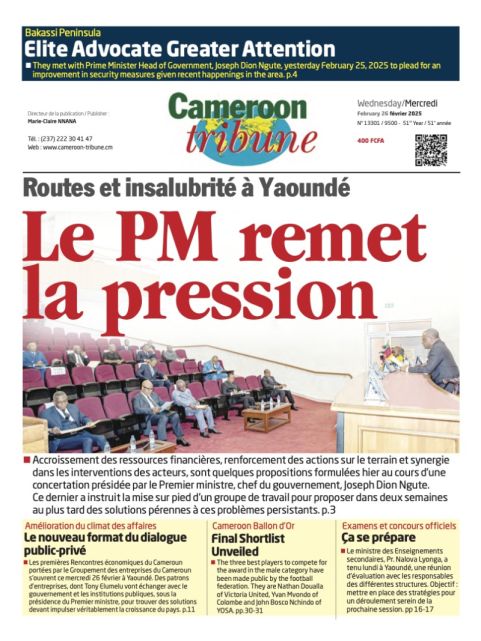Clandestine Foreign Workers : Obstacle To Economic Progress
- Par Richard Kometa
- 02 févr. 2023 13:13
- 0 Likes
Job creation is one of the strong points of the business sector in any economy, because people need to work in order to meet their daily challenges. With the influx of investors from abroad and the need to leverage on the skills and capital that foreign investors bring into the country, the urge to make profit can generally lead those who put in the money to focus on the dividends to the detriment of local work force. Cameroon has often suffered, with structures put in place largely by foreign partners and the technology involved in the execution of such projects never transferred to local personnel, even when such talents exist in the country.
Encouraged by the 2023 Appropriation Act which states in Article 22 that visa fee worth two months of the salary of expatriate workers in the country should be paid to obtain their work permits. The Ministry of Employment and Vocational Training (MINEFOP) has been out to reinforce the legal provisions. It is partly conceived as a salutary approach to get expatriate staff to regularise their situation before settling down to work in Cameroon. It is also an endeavour to ensure that job opportunities that belong to the local work force should not be left in the hands of foreigners. With the processes involved in obtaining a work permit therefore, it will be possible for the State to ascertain whether such job prescriptions must be taken only by foreign workers or such competencies exist in the country. By checking on such practices, it is possible not only to protect the economy through guaranteeing work for citizens, it is also a workable strategy to protect the local workforce.
As part of efforts to implement the legal provisions of the Appropriation Act, the Minister of Employment and Vocational Training on 13 January, 2023 launched the activities of an ad hoc working group to oversee the overall protection of local jobs and envisage the means to train skills in the country that can take up certain positions which are unduly occupied by foreign workers. This in no way can be compared to what exists in other countries whereby people chase away foreigners who are blamed for taking jobs that belong to citizens of the said countries. Rather, this approach is an organised way of transfer of competencies or technology as envisaged by international agreements and business conventions.
In certain countries for instance, no expatriates can bring along domestic workers, drivers, and others. They must use local staff for such less skilled jobs. Conversely, there are countries where the so-called dirty jobs are left in the hands of foreigners, because they are not considered competent to take up white-collar jobs. In such situations, the level of academic training and even skills do not matter. Such cases are either qualified as racist or discriminatory. This is the flips side of the xenophobic coin. Such attitudes could be indeed frustrating and serve as motivating factors for the growing cases of illegal immigration that almost end up with young talents perishing at high seas or in deserts in search of greener pasture. It is painful and inconceivable when people realise that the cottage industry in their country is left in the hands of foreigners. They escape the bad conditions at home only to acquires skills abroad and remain as underlings in a foreign land – unable to shine neither at home nor abroad.
By working to raise revenue that can help Cameroon to provide professional training to certain segments of the population, as Minister Issa Tchiroma Bakary of MINEFOP argued, those involved should know that they are out to serve a national cause by not only protecting nationals, but also exploring an avenue for the upgrading of our national labour force.
Over the years, the cry has been that of the absence of skilled personnel to take up certain key positions in some companies set up by foreign investors. Statistics presenting the presence of over 10,000 illegal foreign workers in the country ...
Cet article complet est réservé aux abonnés
Déjà abonné ? Identifiez-vous >
Accédez en illimité à Cameroon Tribune Digital à partir de 26250 FCFA
Je M'abonne1 minute suffit pour vous abonner à Cameroon Tribune Digital !
- Votre numéro spécial cameroon-tribune en version numérique
- Des encarts
- Des appels d'offres exclusives
- D'avant-première (accès 24h avant la publication)
- Des éditions consultables sur tous supports (smartphone, tablettes, PC)











Commentaires